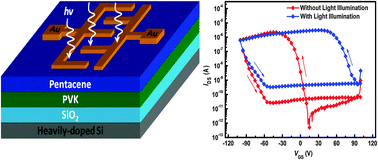Light programmable/erasable organic field-effect transistor ambipolar memory devices based on the pentacene/PVK active layer
Abstract
We demonstrated organic field-effect transistor (OFET) ambipolar memory devices based on unipolar OFETs by utilizing light illumination. The OFET ambipolar memory devices showed stable ambipolar memory properties, and the retention time of both hole-trapping mode and electron-trapping mode could be well maintained for more than 104 s with a high ON/OFF current ratio of 103 and 104, respectively. Moreover, the memory window of the OFET ambipolar memory devices increased to about 70 V, which was twice more than that of the OFET unipolar memory devices. In addition, the memory characteristics of the OFET ambipolar memory devices confirmed that light illumination as well as electrical stress can act as an independent programming/erasing operation method. The results suggested that our research provided an efficient approach to realize the OFET ambipolar memory devices.


 Please wait while we load your content...
Please wait while we load your content...